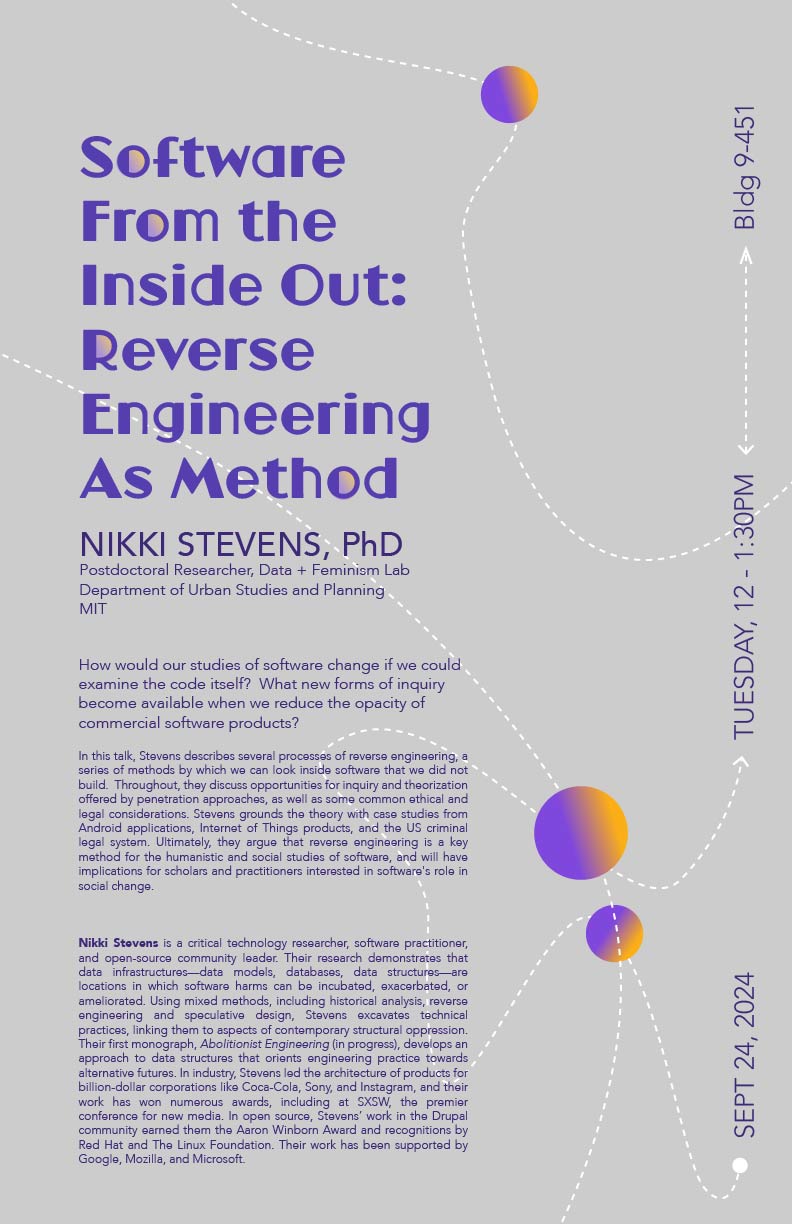I’m so excited to give a talk at MIT on Tuesday. I’ll be talking about reverse engineering. If I need to sound fancy about it, I will tell you that “reverse engineering is a logic and approach that is core to my method.” Put more plainly, I use reverse engineering and other “take it apart and figure out how it works” approaches to academic software research. Details (and poster!) below.
Software from the Inside Out: Reverse Engineering as Method
Nikki Stevens, PhD
Tuesday, Sept 24 12:00-1:15pm EST
In person: Massachusetts Institute of Technology, DUSP: Building 9, Room 451
on zoom: 💻 https://mit.zoom.us/j/96238770940
notes and references https://docs.google.com/document/d/1tEmqYoGV-Egbx8xezwqr7nhzVaV8oNqV2ceU2EwNA2M/edit
Abstract
How would our studies of software change if we could examine the code itself? What new forms of inquiry become available when we reduce the opacity of commercial software products? In this talk, I describe several processes of reverse engineering, a series of methods by which we can look inside software that we did not build. Throughout, I discuss opportunities for inquiry and theorization offered by penetration approaches, as well as some common ethical and legal considerations. I ground the theory with case studies from Android applications, Internet of Things products, and the US criminal legal system. Ultimately, I argue that reverse engineering is a key method for the humanistic and social studies of software and will have implications for scholars and practitioners interested in software’s role in social change.
Bio
Nikki Stevens is a critical technology researcher, software practitioner, and open-source community leader. Their research demonstrates that data infrastructures—data models, databases, data structures—are locations in which software harms can be incubated, exacerbated, or ameliorated. Using mixed methods, including historical analysis, reverse engineering and speculative design, Stevens excavates technical practices, linking them to aspects of contemporary structural oppression. Their first monograph, Abolitionist Engineering (in progress), develops an approach to data structures that orients engineering practice towards alternative futures. In industry, Stevens led the architecture of software products for billion-dollar corporations like Coca-Cola, Sony, and Instagram, and their work has won numerous awards, including at SXSW, the premier conference for new media. In open source, Stevens’ work in the Drupal community earned them the Aaron Winborn Award and recognitions by Red Hat and The Linux Foundation. Their work has been supported by Google, Mozilla, and Microsoft. They are currently a postdoctoral researcher at MIT’s Data + Feminism Lab.
(Downloadable Poster) 📄 Downloadable Poster
